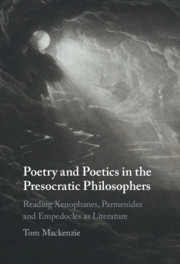 Poetry and Poetics in the Presocratic Philosophers
Poetry and Poetics in the Presocratic Philosophers Book contents
- Poetry and Poetics in the Presocratic Philosophers
- Poetry and Poetics in the Presocratic Philosophers
- Copyright page
- Dedication
- Contents
- Acknowledgements
- Abbreviations
- Note on Fragment Numbers
- Introduction
- Chapter 1 Xenophanes
- Chapter 2 Parmenides
- Chapter 3 Empedocles
- Conclusion
- Epilogue: The Legacy of Presocratic Poetics
- Bibliography
- Index
Chapter 2 - Parmenides
Published online by Cambridge University Press: 05 April 2021
- Poetry and Poetics in the Presocratic Philosophers
- Poetry and Poetics in the Presocratic Philosophers
- Copyright page
- Dedication
- Contents
- Acknowledgements
- Abbreviations
- Note on Fragment Numbers
- Introduction
- Chapter 1 Xenophanes
- Chapter 2 Parmenides
- Chapter 3 Empedocles
- Conclusion
- Epilogue: The Legacy of Presocratic Poetics
- Bibliography
- Index
Summary
The arguments put forth by Parmenides’ goddess have some marked implications for language: mortal terms are deceptive and what truly ‘is’ seems hard to capture in ordinary language. This chapter argues that Parmenides uses poetry in a variety of ways to bypass these difficulties. Verse could be a notoriously deceptive form of discourse in causing its recipients to forget their immediate surroundings and enter into an imagined and potentially illusory mimetic world. In the Doxa section of the poem, Parmenides highlights this quality of his verse to illustrate the wider deceptiveness of mortal sensory experience. On the other hand, the transportive qualities of verse render it a means by which to provide a taster of the ineffable and sublime emotional-cum-cognitive experience of contemplating that which truly is. Moreover, through alluding to meta-literary episodes such as Hesiod’s Theogony proem and the Sirens episode of the Odyssey, Parmenides engages in an ongoing discussion concerning the nature and function of song. His contribution can be regarded as an important moment in the emergence of the Classical conception of poetry: in presenting the Doxa as a poetic world deriving from mortal opinion, Parmenides comes close to Platonic conceptions of literary mimesis.
- Type
- Chapter
- Information
- Poetry and Poetics in the Presocratic PhilosophersReading Xenophanes, Parmenides and Empedocles as Literature, pp. 65 - 101Publisher: Cambridge University PressPrint publication year: 2021
